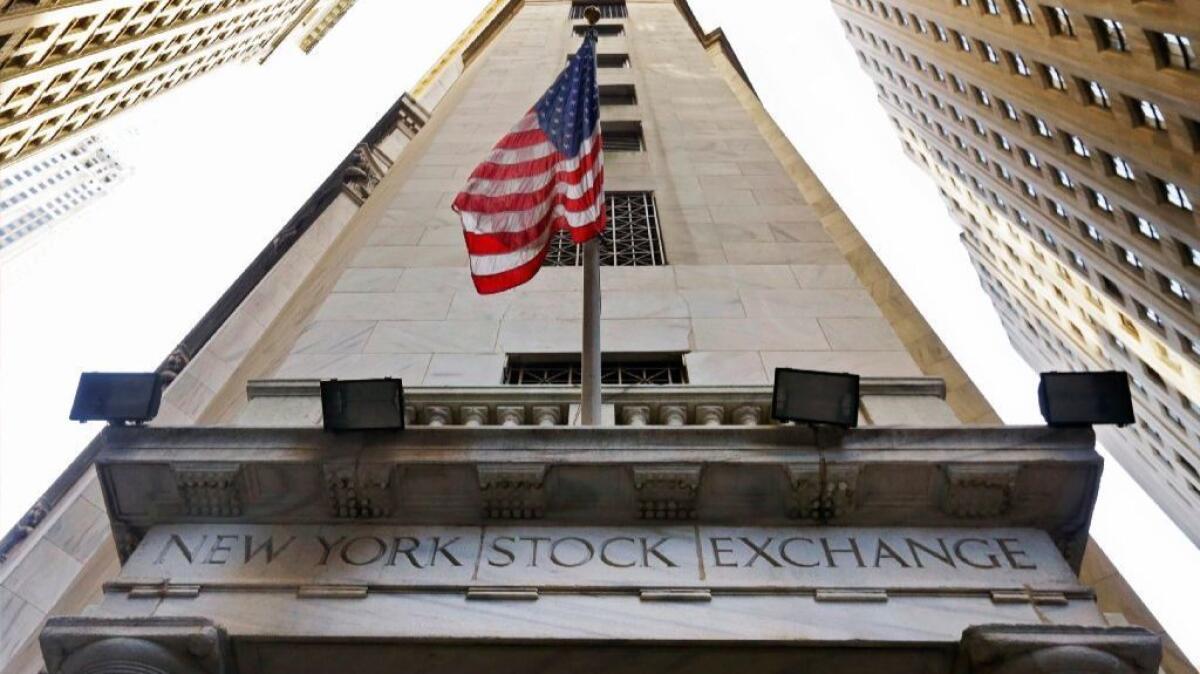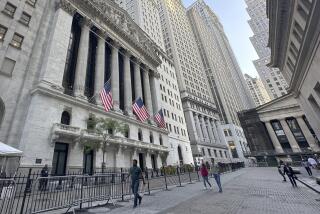Stocks fall on worries that the economy won’t reopen quickly

U.S. stocks fell Wednesday after Wall Street’s earlier bets that the economy can make a relatively quick rebound from the COVID-19 pandemic stopped looking so good.
The Standard & Poor’s 500 index declined 1.7%, its second down day in a row. The stocks hurting the most were of companies that most need a healthy economy for their profits to grow. Treasury yields also sank, a sign of pessimism, after Federal Reserve Chairman Jerome H. Powell warned about the threat of a prolonged recession.
Powell said the federal government may need to pump even more aid into the economy, which is bleeding millions of jobs every week. His comments came the day after the top U.S. infectious-diseases expert, Dr. Anthony Fauci, warned of the dangers of reopening the economy too soon. Together, they threw some some cold water on hopes that have been rising recently among some investors that growth could resume this year as economies reopen.
“Now we think there are more risks to the downside than the upside,” said Liz Ann Sonders, chief investment strategist at Charles Schwab. “Consumers in general are going to be more wary and more interested in boosting savings rates and are unlikely to come back to a world of consumption anywhere near what it looked like before.”
The S&P 500 fell 50.12 points to 2,820.00. The Dow Jones industrial average slid 516.81 points, or 2.2%, to 23,247.97. The Nasdaq composite fell 139.38 points, or 1.5%, to 8,863.17.
The market has been wavering in recent weeks after coming off its best month in a generation. The S&P 500’s 26% rally got going in late March after the Federal Reserve and Capitol Hill promised massive aid to the economy. It then accelerated on optimism as several countries and U.S. states began relaxing restrictions on businesses — restrictions that were meant to slow the spread of the coronavirus but also caused a severe recession.
Many professional investors have said the market rally was overdone, given how much uncertainty exists about how long the recession will last.
Energy producers in the S&P 500 fell 4.4% on Wednesday, the biggest loss among the 11 sectors that make up the index. Financial stocks declined 3%. Those two areas of the market have been some of this year’s biggest losers on expectations for less demand for oil and lower profit from making loans.
Smaller-company stocks also took bigger losses than the rest of the market, which typically happens when worries about the economy’s strength are on the rise. The Russell 2000 index of small-cap stocks dropped 3.3%.
“The market has celebrated discussions of reopening, but there’s a hard reality of: What does reopening even mean?” said Willie Delwiche, an investment strategist at Baird. “And if the market was taking an optimistic view of reopening, you’d see more cyclical leadership start to emerge, things like financials, small-caps and industrials.”
Earlier in the day, strength for technology stocks had helped to steady the market momentarily. Tech stocks have been among the market’s few winners this year as investors hunt for companies that can profit even in a stay-at-home economy. But the gains for tech quickly faded, and nearly 90% of the stocks in the S&P 500 fell Wednesday.
Trading was erratic again, and the S&P 500 went from an early loss of 1.1% to a gain of 0.1% and back to more losses, all in the span of 90 minutes. The volatility echoes Tuesday’s action, when the S&P 500 was close to flat for much of the day before a sudden slide in the last hour of trading left it down 2.1%.
Analysts say they expect the market to remain in a wait-and-see mode for weeks as investors gauge how economic reopenings underway are going. Investors want to see whether second waves of coronavirus infections occur if governments lift their restrictions on businesses too soon. Another possible flare-up in U.S.-China trade tension has also recently weighed on markets around the world.
In China, where the virus first surfaced, authorities announced seven new cases Wednesday. Six were in Jilin province, in the northeast, where alert levels were raised and rail connections suspended. South Korea reported 26 additional cases of the coronavirus over the last 24 hours amid a new increase in infections linked to nightclubs in Seoul.
In Asian stock markets, Japan’s Nikkei 225 slipped 0.5%, the Hang Seng in Hong Kong lost 0.3% and South Korea’s Kospi rose 0.9%. In Europe, Germany’s DAX lost 2.6% and France’s CAC 40 dropped 2.9%. The FTSE 100 in London lost 1.5%.
The yield on the 10-year Treasury fell to 0.65% from 0.69%. U.S. oil to be delivered in June fell 49 cents, or 1.9%, to settle at $25.29 a barrel. Brent crude, the international standard, fell 79 cents, or 2.6%, to $29.19 a barrel.
More to Read
Inside the business of entertainment
The Wide Shot brings you news, analysis and insights on everything from streaming wars to production — and what it all means for the future.
You may occasionally receive promotional content from the Los Angeles Times.










